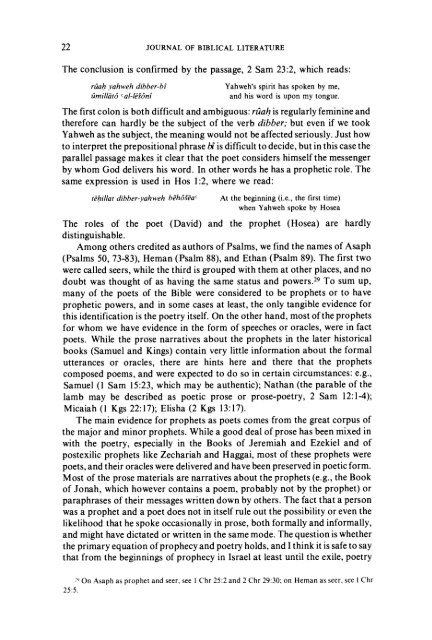POTTERY, POETRY, AND PROPHECY: AN ESSAY ON BIBLICAL ...
POTTERY, POETRY, AND PROPHECY: AN ESSAY ON BIBLICAL ...
POTTERY, POETRY, AND PROPHECY: AN ESSAY ON BIBLICAL ...
You also want an ePaper? Increase the reach of your titles
YUMPU automatically turns print PDFs into web optimized ePapers that Google loves.
22<br />
JOURNAL OF <strong>BIBLICAL</strong> LITERATURE<br />
The conclusion is confirmed by the passage, 2 Sam 23:2, which reads:<br />
ruah yahweh dibber-bi<br />
umilldt6 cal-leoni<br />
Yahweh's spirit has spoken by me,<br />
and his word is upon my tongue.<br />
The first colon is both difficult and ambiguous: ruah is regularly feminine and<br />
therefore can hardly be the subject of the verb dibber; but even if we took<br />
Yahweh as the subject, the meaning would not be affected seriously. Just how<br />
to interpret the prepositional phrase bi is difficult to decide, but in this case the<br />
parallel passage makes it clear that the poet considers himself the messenger<br />
by whom God delivers his word. In other words he has a prophetic role. The<br />
same expression is used in Hos 1:2, where we read:<br />
tehillat dibber-yahweh behoseac<br />
At the beginning (i.e., the first time)<br />
when Yahweh spoke by Hosea<br />
The roles of the poet (David) and the prophet (Hosea) are hardly<br />
distinguishable.<br />
Among others credited as authors of Psalms, we find the names of Asaph<br />
(Psalms 50, 73-83), Heman (Psalm 88), and Ethan (Psalm 89). The first two<br />
were called seers, while the third is grouped with them at other places, and no<br />
doubt was thought of as having the same status and powers.29 To sum up,<br />
many of the poets of the Bible were considered to be prophets or to have<br />
prophetic powers, and in some cases at least, the only tangible evidence for<br />
this identification is the poetry itself. On the other hand, most of the prophets<br />
for whom we have evidence in the form of speeches or oracles, were in fact<br />
poets. While the prose narratives about the prophets in the later historical<br />
books (Samuel and Kings) contain very little information about the formal<br />
utterances or oracles, there are hints here and there that the prophets<br />
composed poems, and were expected to do so in certain circumstances: e.g.,<br />
Samuel (1 Sam 15:23, which may be authentic); Nathan (the parable of the<br />
lamb may be described as poetic prose or prose-poetry, 2 Sam 12:14);<br />
Micaiah (1 Kgs 22:17); Elisha (2 Kgs 13:17).<br />
The main evidence for prophets as poets comes from the great corpus of<br />
the major and minor prophets. While a good deal of prose has been mixed in<br />
with the poetry, especially in the Books of Jeremiah and Ezekiel and of<br />
postexilic prophets like Zechariah and Haggai, most of these prophets were<br />
poets, and their oracles were delivered and have been preserved in poetic form.<br />
Most of the prose materials are narratives about the prophets (e.g., the Book<br />
of Jonah, which however contains a poem, probably not by the prophet) or<br />
paraphrases of their messages written down by others. The fact that a person<br />
was a prophet and a poet does not in itself rule out the possibility or even the<br />
likelihood that he spoke occasionally in prose, both formally and informally,<br />
and might have dictated or written in the same mode. The question is whether<br />
the primary equation of prophecy and poetry holds, and I think it is safe to say<br />
that from the beginnings of prophecy in Israel at least until the exile, poetry<br />
'9 On Asaph as prophet and seer, see 1 Chr 25:2 and 2 Chr 29:30; on Heman as seer, see I Chr<br />
25:5.
















